Caring for Others Extends Life, Verified by New Study
If you help and support others in old age, you're also doing yourself a favor by living longer, according to findings published in Evolution and Human Behavior.
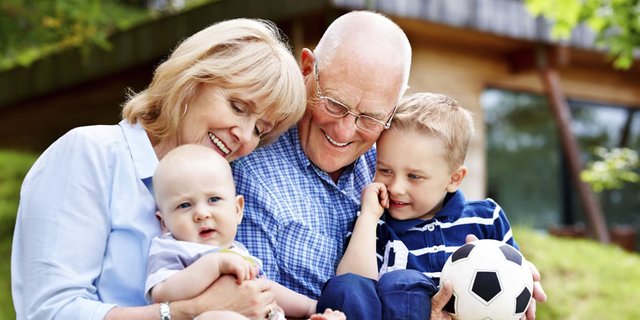
source
Researchers from Switzerland, Germany and Australia found that grandparents who care for their grandchildren live longer than grandparents who don't. The study analyzed over 500 people between the ages of 70 and 103 years, also pulling in data from the Berlin Aging Study for a 20 year period between 1990-2009.
Previous studies the grandparents studied included primary or custodial caregivers. This study looked at those who do it less often, grandparents who provided occasional childcare, to see if there was still in effect. The study also looked at other older adults who did not have children or grandchildren but did provide care for others in their social network.
Emotional Support
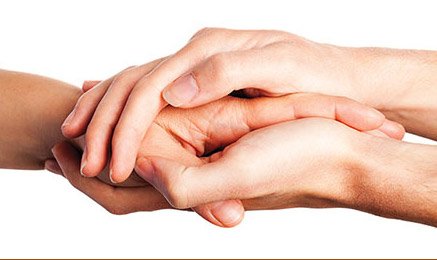
source
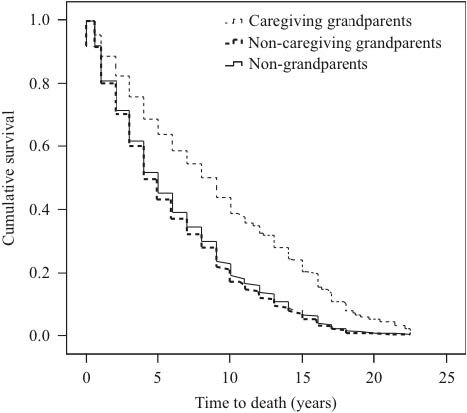
Survival curves as a function of time to death for caregiving grandparents, noncaregiving
grandparents, and non-grandparents
Looking at the data from 1990, 50% of grandparents who took care of their grandchildren were alive 10 years after that first interview. The same was true for those who didn't have grandchildren yet supported their children by helping with housework. Those who did not help others, were not so fortunate as 50% died within five years of the original interview in 1990.
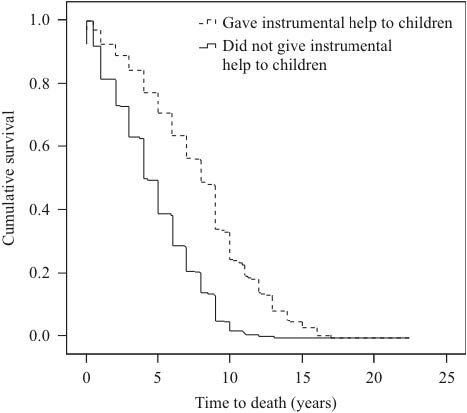
Survival curves as a function of time to death for non-grandparents who gave
instrumental help to their adult children and those who did not.
As mentioned before, you don't need to have children to benefit from caring for others. You don't even need to help and care for others within your family. The data showed childless older adults who provided emotional support also benefited. For these people, 50% lived another 7 years, while non-helpers on the lived for another 4 years, on average.
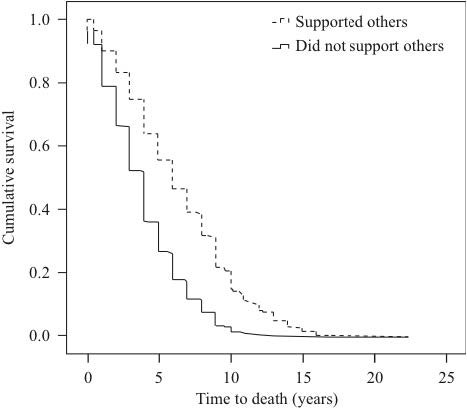
Survival curves as a function of time to death for childless participants who
supported others in their social network and those who did not.
Too Much Help... Can Be a Bad Thing

source
Helping is a good thing, as long as you're not driven to worry or stress about helping others in order to get a longer life. Just because you help, doesn't mean you're going to get the positive effects if there are other psychological factors affecting your physiological and physical well-being.
Previous studies have shown that more intense caregiving causes more stress and negatively impacts mental and physical health.
Not all illnesses require the same level of care and activity on the part of a caregiver. Caregiving can be really hard when taking care of chronically ill people. This can be a very stressful occupation. Many caregivers are on call 24 hours a day, 7 days a week, 365 days a year. These people really do care and are devoted to helping others... too much. That kind of self-sacrifice, despite appearing healthy, is not healthy for ourselves.
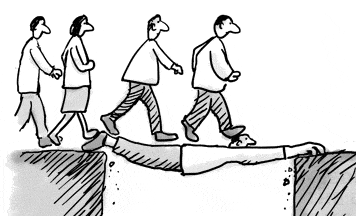
source
Cultural differences affected the studies data used, such as the exclusion of primary or custodial caregivers, due to Germany and Switzerland generally not having this custom in their culture, despite it being popular in North America.
The study did indeed look at older people and not young people, as the effects of caregiving can be more directly associated and correlated with longevity. This does not discount the lifelong benefits of assisting, helping our caring for others in life. The psychological, physiological and physical benefits to our health can be accrued all of our lives. We don't need to wait until we are older and approaching death in order to benefit from a concern and care towards others.
Prosocial Behavior
Due to the assistance, help and care most likely being given to another family member, such as children or someone ill, researchers theorize that prosocial behavior was originally rooted in the family.
Sonja Hilbrand, an author of this study, said:
"It seems plausible that the development of parents’ and grandparents’ prosocial behavior toward their kin left its imprint on the human body in terms of a neural and hormonal system that subsequently laid the foundation for the evolution of cooperation and altruistic behavior towards non-kin."
Other-oriented vs. Reciprocity-oriented
One thing to note, however, is that the study might have limitations, such as not including information about the motives for helping. Previous findings indicated that beneficial effects of prosocial behavior on health and mortality is a result being other-oriented and not reciprocity-oriented.
This means that if you do things for others in order to help yourself, you're not creating the psychological framework of concern and care for another. It's still revolving around yourself, and not others. Being rewarded directly is secondary in terms of the benefits for everyone from inclusive fitness of the social group surviving.
The engine driving us to help others is not reciprocity-based. Psychological data suggests "an expectation of reciprocal reward in the future overrides the positive effects of helping."
There is a lot of joy to be gained from helping those we care about. We derive satisfaction and pleasure from helping others. Being appreciated and valued in the lives of others gives us more meaning in our own lives. We pay attention to others, and others pay attention to us, and we feel more connected to each other's lives.
That's what we do on one day of the year, focusing on what we can do to help others in our social circle. However, we can embody and live the "Spirit of Christmas" any day.
TL;DR: All helper groups, from grandparents who care for their grandchildren, parents who provide help to their own adult children, to childless participants who helped others around them, all had higher survival probabilities than those in a non-helper capacity. Helping others does not only provide beneficial health effects, but also seems to provide a longer life. This is the first study to show a link between caregiving and mortality benefits, as previous studies confirmed only the health benefits.
What do you think? How do you feel when helping others?
Thank you for your time and attention! I appreciate the knowledge reaching more people. Take care. Peace.
References:
- Helping pays off: People who care for others live longer
- Caregiving within and beyond the family is associated with lower mortality for the caregiver: A prospective study
If you appreciate and value the content, please consider:
@krnel
2016-12-23, 11:31am

Hello @krnel,
Congratulations! Your post has been chosen by the communities of SteemTrail as one of our top picks today.
Also, as a selection for being a top pick today, you have been awarded a TRAIL token for your participation on our innovative platform...STEEM.
Please visit SteemTrail to get instructions on how to claim your TRAIL token today.
If you wish to learn more about receiving additional TRAIL tokens and SteemTrail, stop by and chat with us.
Happy TRAIL!

Thank you :)
Interesting stuff as always!